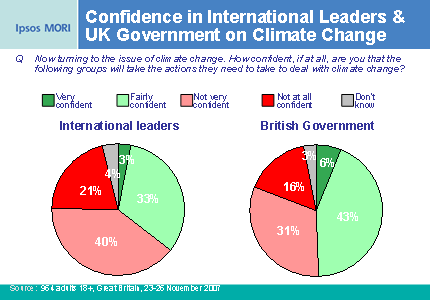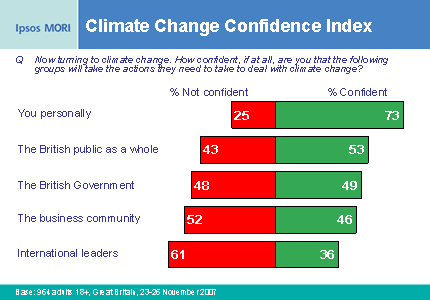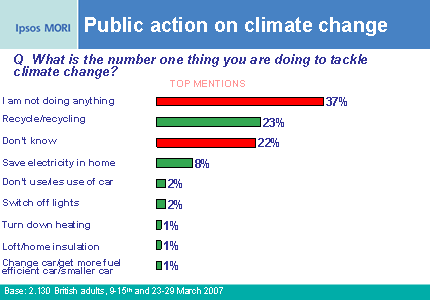Public Not Confident That International Leaders Can Reach Climate Deal
As the World's leaders head into a final week of negotiations in Bali to discuss the framework for international efforts to address climate change, new research by Ipsos reveals that around six in ten (61%) of the British public lack confidence in the ability of international leaders to address the problem.
- 40% say they are "not very confident", and a further one in five (21%) are "not at all confident".
- In contrast, only 3% are "very confident" and a further 33% "fairly confident".
Confidence in the ability of the British Government to act is higher, although a clear divide remains -- 49% are confident compared to 48% who are not.

There are some variations across the public -- in particular, men are more likely to lack confidence in international leaders (65% compared to 57% of women), along with older groups (66% of those aged 55+ compared to 55% of those aged 18-34) and broadsheet newspaper readers (65% compared to 59% of tabloid readers).
Phil Downing, Head of Environmental Research at Ipsos, says "Public confidence in the Government's ability to take the actions required to address climate change has increased of late, in response to policy landmarks such as the Stern Review, the Climate Change Bill and the recent attention given to the environmental agenda by the three main parties. However, this is not true of confidence in the ability of international leaders to come together and agree an effective climate change deal to succeed the Kyoto Protocol".
These results form part of Ipsos's Climate Change Confidence Index. This demonstrates that while the public lack confidence in international leaders they are much more upbeat about their own ability to act, as well as society more widely.

What this means remains unclear: a public increasingly knowledgeable and equipped to act? Or an underestimation among people of the scale of change required? A study conducted by Ipsos on behalf of the Environment Agency earlier this year on the kinds of actions people are already taking hints at the latter. This showed that 59% are not doing anything or don't know what they're doing to tackle climate change. Indeed, the fact that public actions in 2007 remain, for the most part, limited to recycling and home energy efficiency suggests that there may be a disconnect between what the public consider as "doing their bit" and the aspirations of Government for individual and societal behaviour change, most notably around transport and travel.

Technical Details
Ipsos interviewed 964 British adults 18+. Fieldwork was conducted by telephone between 23-26 November 2007. Data are weighted to the known national population profile. An '*' indicates a finding of less than 0.5%, but greater than zero. Where percentages do not add up to exactly 100% this may be due to computer rounding, the exclusion of "don't knows" or to multiple answers.



